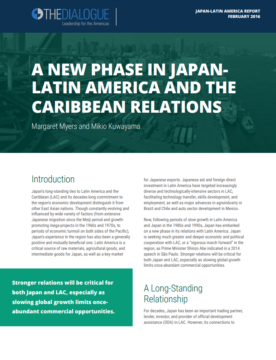
A New Phase in Japan-Latin America and the Caribbean Relations
For decades, Japan has been an important trading partner, lender, investor, and provider of official development assistance in Latin America and the Caribbean.
On September 17, the Inter-American Dialogue and the Japan Association of Latin America and the Caribbean held a public meeting examining Japan’s growing engagement with Latin America. The event featured opening remarks from Congressman Joaquín Castro (D-TX), co-chair of the bipartisan US-Japan Caucus.
AUDIO: Welcome and Opening Remarks
Japan has become a critical partner for Latin America and the Caribbean (LAC) over the past few decades. Although Japan’s trade with the region is relatively limited (Japan represents 3 percent of LAC trade and LAC represents less than 5 percent of Japanese trade), Japan is Asia’s largest investor in LAC. Japanese foreign direct investment in the region averaged $6.9 billion per year between 2010 and 2013.
Japan also provided over $100 billion in finance to LAC over the past sixty years. As Japan Bank of International Cooperation (JBIC) representative Takahiro Hosojima indicated during the meeting, Japanese finance has shifted from an initial focus on export financing in the 1960s and 1970s, to Latin American debt crisis assistance in the 1980s, and interest-free infrastructure financing in the 1990s. More recently, JBIC has focused its efforts on public-private partnerships in the region.
AUDIO: A New Era in Japan-LAC Relations?
In the coming years, Japan is seeking more in the way of economic engagement, but also to expand cooperation on global governance and in human resource development and technology transfer, as Yasushi Takase, director general of the Latin American and Caribbean Affairs Bureau of the Japanese Ministry of Foreign Affairs indicated. Japanese Prime Minister Shinzo Abe articulated these interests and announced three “guiding principles” for future Japan-LAC relations (progress together, lead together, and inspire together) during a speech in Brazil in 2014.
[caption id="attachment_42176" align="alignleft" width="300"]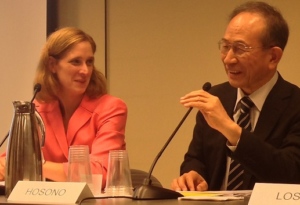 Barbara Kotschwar (PIIE) and Akio Hosono (JICA)[/caption]
Barbara Kotschwar (PIIE) and Akio Hosono (JICA)[/caption]Japan International Cooperation Agency (JICA) advisor Akio Hosono indicated continued commitment on the part of Japanese firms and the Japanese government to a “Japan model” of overseas engagement, focused on quality growth and inclusive development. Japan, he said, has promoted people-centered investment and contributed to higher value-added export in Latin America for many years. Japanese assistance helped transform Brazil’s cerrado region into the country’s agricultural heartland. Japanese technical assistance also supported the development of Chile’s booming salmon industry.
VIDEO: The Japan Model of Economic Engagement
According to Claudio Loser, non-resident senior fellow at the Inter-American Dialogue, Japan is viewed positively across the region because of its commitment to mutual development. The same is true in other regions, as Mireya Solis indicated. Seventy-one percent the Asia-Pacific population has a favorable impression of Japan.
Even so, panelists saw opportunity for further Japanese engagement with LAC. As Mireya Solís noted, upon approval of the Japan-Colombia Economic Partnership Agreement (EPA), Japan will be the only Asian nation that has free trade agreements with all four members of the Pacific Alliance (Mexico, Colombia, Peru, and Chile). Solís suggested that Japan consider cumulative rules of origin and other means by which to promote value chain linkages among the PA nations.
[caption id="attachment_42179" align="alignright" width="500"]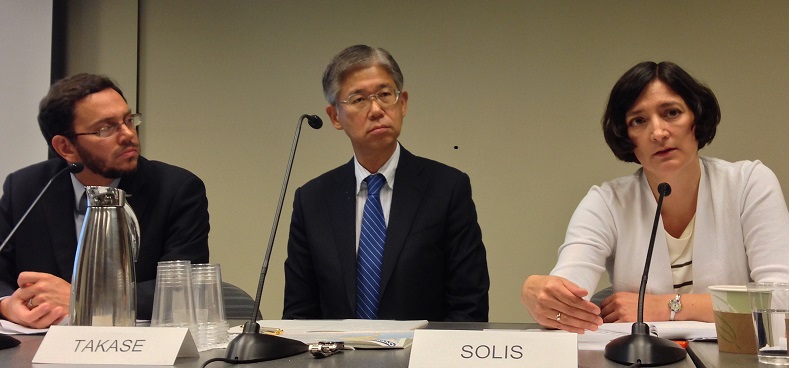 Francisco Rodriguez (Johns Hopkins - SAIS), Yasushi Takase (Japan MOFA), and Mireya Solís (Brookings)[/caption]
Francisco Rodriguez (Johns Hopkins - SAIS), Yasushi Takase (Japan MOFA), and Mireya Solís (Brookings)[/caption]Speakers also suggested that Japan explore opportunities for cooperation with other Asian nations and with the United States in Latin America. References to Japanese and Chinese competition in Latin America have been common in the media and academic literature, especially following Chinese President Xi Jinping’s and Japanese Prime Minister Shinzo Abe’s consecutive trips to Latin America in 2014. Takahiro Hosojima indicated that there are many opportunities for Japan and China to cooperate in Latin America, however, especially in the agricultural sector.
Despite some concern about Japan’s own economic development, panelists predicted growth in Japan-Latin America relations in the coming years. The relationship has withstood past episodes of economic turbulence.
Participants agreed that future Japan-LAC relations will be driven by multiple factors , including Japan’s industrial policy and domestic demand, the interests of the 2,000 Japanese companies now present in Latin America, greater tolerance for risk among Japan’s major lenders, large overseas Japanese communities in Latin America, and Tokyo’s enhanced foreign policy toward the region.
For decades, Japan has been an important trading partner, lender, investor, and provider of official development assistance in Latin America and the Caribbean.
Although growth is slowing on both sides of the Pacific, Japan would appear committed to continued economic engagement with the region.
On October 17, the Inter-American Dialogue, JALAC, COMEXI, COMCE, and the Embassy of Japan in Mexico, held a public meeting to examine developments in Japan’s long-standing relationship with Mexico.
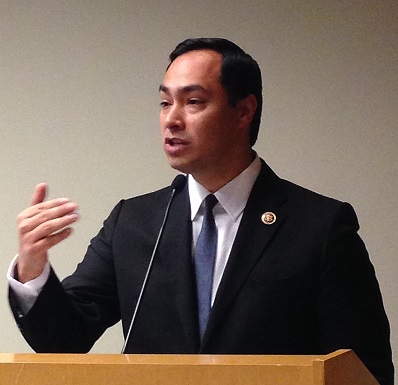
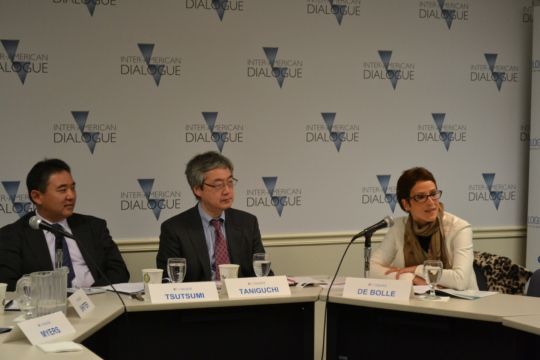 Video
Video
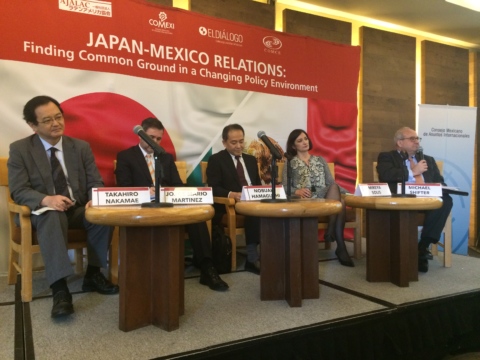 Video
Video